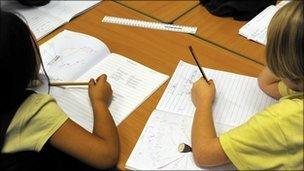Free school bids ordered to be disclosed
- Published

Free schools can be set up by charities, community groups and parents
The identity of groups wanting to open free schools will have to be publicly revealed, despite the objections of the government.
The Department for Education has been told to publish details of applicants wanting to set up a free school.
The Information Tribunal rejected an attempt by the government to withhold this information.
A Department for Education spokeswoman said ministers would consider the decision and "respond in due course".
Free schools are state-funded schools which are set up by groups of parents, charities or other providers. There are about 80 already open with plans for a further 102 this year.
'Transparency'
The Department for Education had previously rejected Freedom of Information requests for details of the groups wanting to set up schools.
The Information Commissioner had backed the requests, but the government had appealed against this decision.
The education department had argued that revealing the identity of unsuccessful applicants could put them off from re-applying or could deter interest from other groups.
It also made the case that the identities of any bids would become public once they had got beyond an initial application - and that the only extra information to be revealed would be those groups rejected at the first stage.
But the Information Tribunal rejected the appeal and ruled that "the balance of public interest favoured disclosure".
"The free school programme involves substantial public funds and significant changes to the way the education service is controlled, managed and delivered," the tribunal concluded.
"It is a matter of considerable public importance and the transparency of the process and its openness to public debate and consideration are of concern to communities across England."
The legal ruling highlighted the "poor" quality of a survey used by the department to argue its case - saying its bias "fatally undermines" its credibility.
The survey from the New Schools Network, which advises on setting up free schools, had been used to show that applicants might have been deterred if their bids had been made public at an initial stage.
"The Tribunal was surprised that a Department of State should have chosen to rely on a survey which even on its face was of doubtful reliability but which on further analysis is deeply suspect."
The requests for information had come from the Guardian newspaper, the Association of Colleges and the British Humanist Association (BHA).
Chris Walden of the Association of Colleges said: "We also hope that it sets a standard that regular lists will be published so that the sector as a whole can work toward a clear understanding of what is and is not wanted in the establishment of free schools."
The BHA's Richy Thompson said: "We are delighted with today's ruling in our favour, which represents a victory for transparency and democracy."
Natalie Evans, director of the New Schools Network said: "We are seriously concerned about the impact of this ruling; if just one person is put off wanting to set up a free school for fear of reprisals, then it is one person too many."
The Department for Education will now have to decide whether to submit a further appeal to the Upper Tribunal.
- Published11 October 2012
- Published25 March 2011
- Published13 July 2012